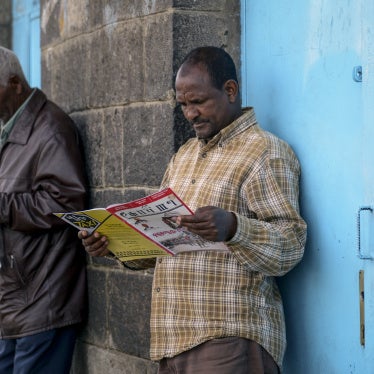What has brought the latest crisis in the east of the Democratic Republic of Congo to international attention is straightforward enough. The conflict there is the cause of untold human suffering: daily killings of civilians, rape, recruitment of child soldiers and hundreds of thousands of people on the run. The UN peacekeeping force in Congo, the largest in the world, has proved incapable of protecting ordinary Congolese from the depredations of the region's political and military leaders.
But as soon as journalists start to explain the background to all this suffering, they run into a big problem: It's very complex. For example, the latest escalation in the conflict is the consequence of an effort by an ambitious Tutsi rebel leader, Laurent Nkunda, to seize power in North Kivu, a province in eastern Congo. Nkunda is partly supported by neighbouring Rwanda, which has twice invaded Congo since 1996. He is opposed by Congo's President, Joseph Kabila, whose undisciplined and incompetent army is allied to Rwandan Hutu rebels linked to the Rwandan genocide of 1994.
It's the kind of simplistic explanation that journalistic brevity imposes. But it begs many questions.
For answers, I recommend starting with King Leopold's Ghost: A Story of Greed, Terror, and Heroism in Colonial Africa (Houghton-Mifflin, 1998), by Adam Hochschild. I read this brilliant dissection of Congo's colonial history while I was living in Congo some years ago, and I was struck by how little had changed. In the 19th century, the suffering of the Congolese people was the direct result of the greed of a colonial monarch, King Leopold II of Belgium, for Congo's resources. Today, the actors have changed and multiplied to include African despots and multinational companies. And it's not rubber, but gold, diamonds and other minerals they are after. But the link between the looting of natural resources and massive human suffering remains the same.
Yet, there's an inspiring message, too, in Hochschild's book: the power of individuals to bring change by naming and shaming those responsible for perpetuating a corrupt and brutal system. Long before the emergence of professional human rights organizations, dedicated individuals such as Edmund Morel and Roger Casement helped to bring an end to the worst of King Leopold's abuses through tireless documentation and campaigning.
Hochschild's book takes the reader up to the end of Belgian colonial rule. Michela Wrong's In the Footsteps of Mr. Kurtz (Fourth Estate, 2001) is a riveting account of one of Africa's most extraordinary dictators, Mobutu Sese Seko, who came to power in the violent chaos that followed the Belgian withdrawal from Congo in 1960.
Wrong, a journalist who reported from Kinshasa in the 1990s, demonstrates with a combination of sparkling anecdotes and sharp political analysis how, in spite of his nationalist rhetoric (Mobutu change the country's name from Congo to Zaire), the dictator's manipulation of ethnic conflicts and his encouragement of massive corruption kept the majority of Congolese in dire poverty and set the stage for the implosion of the country in the 1990s.
When he was overthrown by a Rwanda-backed rebel army in 1996, Mobutu's dictatorship had already been teetering on the brink of collapse. Wrong's book helps to explain the regional politics that made the 1994 Rwandan genocide the trigger for the regional war that swept Mobutu from power and unleashed a maelstrom of conflict that continues to this day.
My third choice is technically a work of fiction and imagination, but it is so well researched and so beautifully written that it helps us enormously to understand the reality of today's Congo and the political complexities that have led to the emergence of current Tutsi rebel leader Laurent Nkunda. When researching her novel The Rebels' Hour (Grove Press, 2008), Dutch writer Lieve Joris spent years following the career of a young Tutsi from the Banyamulenge tribe of the High Plateau in South Kivu.
The central character, Assani, joins the Tutsi-dominated rebel army, the AFDL, which, reinforced by soldiers of the Rwandan army, overthrows Mobutu and establishes Laurent Kabila in power in 1996. But he quickly falls afoul of the slothful Kabila (who was assassinated in 2001 and replaced by his young son, Joseph Kabila) and joins the second Rwandan-backed rebellion against Kinshasa in 1998.
This rebellion sparks a regional war that draws in the armies of six neighbouring states. Joris's novel presents a stark picture of a young man forced to navigate the violent ethnic politics of the region and to choose between becoming a victim or a predator.
These three books are essential to understanding the situation in Congo today, but for those who want to read about recent events, I would urge picking up Bryan Mealer's excellent All Things Must Fight to Live: Stories of War and Deliverance in Congo (Bloomsbury). Mealer covered the "postwar" transition period in the Congo from 2003 to 2006 for the Associated Press. His book eloquently describes how the vast majority of Congolese hoped beyond hope that the 2006 elections would at last put an end to their suffering and usher in a new era. Mealer gives us the stories of the immense resilience and fortitude of the Congolese people. At the same time, he shows on what flimsy grounds were based the repeated claims of international bureaucrats and Western politicians that Congo's transition was "on the right track."
The ongoing conflict in North Kivu has now discredited the naive belief that elections alone could turn Congo around. But that's no excuse for diplomats to turn their backs on the millions of Congolese who want an end to a conflict that is the product of more than a century of misrule and malign interference by Congolese and foreigners alike.
Anneke Van Woudenberg is senior researcher on the Democratic Republic of Congo at Human Rights Watch in London, England.







